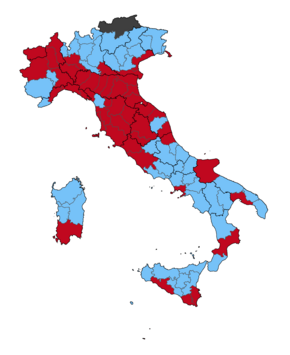1984 European Parliament election in Italy
| |||||||||||||||||||||||||||||||||||||||||||||||||||||||||
All 81 Italian seats to the European Parliament | |||||||||||||||||||||||||||||||||||||||||||||||||||||||||
| Turnout | 82.47% ( | ||||||||||||||||||||||||||||||||||||||||||||||||||||||||
|---|---|---|---|---|---|---|---|---|---|---|---|---|---|---|---|---|---|---|---|---|---|---|---|---|---|---|---|---|---|---|---|---|---|---|---|---|---|---|---|---|---|---|---|---|---|---|---|---|---|---|---|---|---|---|---|---|---|
This lists parties that won seats. See the complete results below.
| |||||||||||||||||||||||||||||||||||||||||||||||||||||||||
The 1984 European Parliament election in Italy was held on 17 June 1984. The election took place just a week after the death of Italian Communist Party (PCI) leader Enrico Berlinguer; this fact greatly influenced the vote, producing a historical result.[1]
Electoral system
[edit]The pure party-list proportional representation was the traditional electoral system of the Italian Republic since its foundation in 1946, so it had been adopted to elect the Italian representatives to the European Parliament too. Two levels were used: a national level to divide seats between parties, and a constituency level to distribute them between candidates. Italian regions were united in 5 constituencies, each electing a group of deputies. At national level, seats were divided between party lists using the largest remainder method with Hare quota. All seats gained by each party were automatically distributed to their local open lists and their most voted candidates.
Results
[edit]The public emotion caused by Berlinguer's tragic death resulted in an extraordinary strength for the PCI;[1] for the first time in Western Europe since the 1956 French legislative election and the first time ever in Italian history, a Communist party received a plurality by a democratic vote.
In opposition, this result reinforced the moderate government ruling the country. The Italian Socialist Party of Prime Minister Bettino Craxi had maintained its vote, and its major ally, the defeated Christian Democracy, did not want to take any chances of a political crisis that could lead to dangerous general election.
| National party | EP group | Main candidate | Votes | % | +/– | Seats | +/– | ||
|---|---|---|---|---|---|---|---|---|---|
| Italian Communist Party (PCI) | COM | Enrico Berlinguer | 11,714,428 | 33.33 | 3.76 |
27 | 3 | ||
| Christian Democracy (DC) | EPP | Ciriaco De Mita | 11,583,767 | 32.96 | 3.49 |
26 | 3 | ||
| Italian Socialist Party (PSI) | SOC | Carlo Tognoli | 3,940,445 | 11.21 | 0.18 |
9 | 0 | ||
| Italian Social Movement (MSI) | ER | Giorgio Almirante | 2,274,556 | 6.47 | 1.02 |
5 | 1 | ||
| Italian Liberal Party – Italian Republican Party (PLI–PRI) | LD | Sergio Pininfarina | 2,140,501 | 6.09 | 2.46 |
5 | 2 | ||
| Italian Democratic Socialist Party (PSDI) | SOC | Giovanni Moroni | 1,225,462 | 3.49 | 0.83 |
3 | 1 | ||
| Radical Party (PR) | NI | Enzo Tortora | 1,199,876 | 3.41 | 0.26 |
3 | 0 | ||
| Proletarian Democracy (DP) | RBW | Emilio Molinari | 506,753 | 1.44 | 0.72 |
1 | 0 | ||
| South Tyrolean People's Party (SVP) | EPP | Joachim Dalsass | 198,220 | 0.56 | 0 |
1 | 0 | ||
| Federalism (UV–PSd'Az–Others) | RBW | Michele Columbu | 193,430 | 0.55 | 0.08 |
1 | 1 | ||
| Venetian League (ŁV) | None | 164,115 | 0.47 | — | 0 | 0 | |||
| Valid votes | 35,141,553 | 94.80 | |||||||
| Blank and invalid votes | 1,928,073 | 5.20 | |||||||
| Totals | 37,069,626 | 100.00 | — | 81 | — | ||||
| Electorate (eligible voters) and voter turnout | 44,948,253 | 82.47 | 2.91 |
||||||
| Source: Italian Ministry of the Interior | |||||||||
See also
[edit]External links
[edit]- ^ a b Lomellini, Valentine (2015). "The PCI and the European Integration from Eurocommunism to Berlinguer's Death". In Bonreschi, Lucia; Orsina, Giovanni; Varsori, Antonio (eds.). European Political Cultures and Parties and the European Integration Process, 1945–1992. Bern: Peter Lang. ISBN 978-2-87574-279-7.

